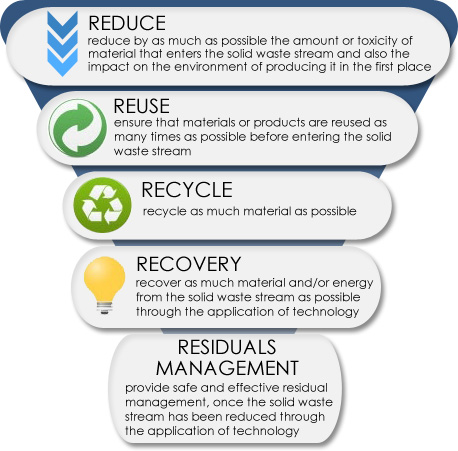What are the 5 R's of Waste Reduction?

1) Reduce
The most important part of waste minimization. Reducing waste means not purchasing goods to begin within, limiting your consumption to mostly needs and limited wants, saying no to excess packaging, and one-time use items.
2) Reuse
Second most desirable on the waste minimization triangle. Reuse includes repairing broken items, finding new purposes for or donating old and unused items, and using things like reusable shopping bag and water bottles as alternatives to single-use items.
3) Recycle
Recycling is what you do if you CANNOT reduce or reuse an item. Recycle as much as possible to keep material out of landfills. Remember that not properly sorting recycling can do more harm than good, to learn more about how to sort your recycling by visit the Curbside Recycling or Landfill Recycling Depot pages.
4) Recover
As it applies to waste minimization, is reclaiming energy or recyclable materials from the waste stream.This is typically done by waste to energy technology.
5) Residuals
The last phase in the triangle. Residual management is the final treatment and/or disposal of a waste that cannot be used in any other way. This means disposing of it in your curbside garbage cart, or taking it to the landfill.
At Home:
1) Recycle More & Better
Most materials are in-fact recyclable. Did you know that when we don't properly sort recycling (i.e. plastic bags in curbside recycling) it can make the whole recycle truck end up in the landfill? Learn more about recycling by visiting the Landfill Recycling Depot and Curbside Recycling pages.
2) Make Use of Leftovers
Try 'Kitchen Sink' recipes to reduce food waste. Use old vegetables, leftovers and products gone unused to keep edible food out of landfills. Recipes like quiche, stir-fry's, and soup are all good examples of putting leftovers to use, not only will this reduce waste, but it saves money!
3) Avoid
Do not use single-use items in your home. Consider ceramic dishware, metal or bamboo cutlery, and glass products instead of their disposable counter-parts. Use cloths instead of paper towel. Simple switches can go a long way.
In Your Yard:
1) Consider Composting
A large portion of waste in landfills is in-fact compostable material that could have been re-purposed into good-for-your-garden compost. Vegetable scraps, egg shell, coffee grinds, tea bags and more can all be composted.Interested in composting at home? For more information on composting at home visit the RDOS Composting and Natural Yard Care page.
2) Try 'Grasscycling'
Grasscycling is the practice of leaving grass clippings on the lawn after mowing. Letting clippings decompose naturally back into grass restores Nitrogen, helps lawns retain water, and keeps lawns healthy. Grasscycling keeps lawns green,and reduces yard waste going to landfills. To learn more about natural lawn care click here.
3) USE Your Compost
Using compost not only gives plants the nutrients they need to grow strong, but helps them retain water. This reduces irrigation needs. Further, using compost limits the need for other garden products(i.e. fertilizers), keeping your lawn green and saving you money! For information on the sale of District of Summerland compost. Learn more about backyard composting here.
Shopping:
1) Bring Your Own
Bring your own grocery bags, mesh net bags for produce, and containers for packaging goods and carrying them. Keep containers and bags in your car or purse to ensure they're always with you and not forgotten!
2) Buy Bulk
Consider purchasing bulk goods which can be put into reusable containers, bags and your own packaging. This eliminates unnecessary waste from packaging, lets you purchase the correct amount for your needs (no excess), and re-purposes old or unused containers.
3) Know Your Needs vs.Wants
Only purchase items you know you'll use. Distinguish needs from wants. Ask yourself: is this a one-time use item or do I already own something similar? Am I purchasing this on an impulse or have I thought about it for at least a month?
General Tips:
1) Eliminate Single Use
Bring a reusable coffee mug with you to avoid using paper coffee cups which either requires recycling (using energy and resources), or ends up in landfills. Use refillable water bottles instead of plastic ones. Many shops offer a small discount for bringing your own mug, ask at the counter.
2) Reduce Your Emissions
Summerland is a community where many people are fortunate to live close to work, grocery stores, schools etc. Where it is feasible, consider walking, carpooling, or biking to where you need to go. Reducing your carbon footprint significantly contributes to a waste reduction lifestyle.
3) Be Water Conscious
Water is a limited resource in the beautiful Okanagan Valley. Try reducing your shower time, washing only full loads of laundry, and washing in cold, instead of hot water. Water plants and compost piles with leftover "grey water" from bathing, washing dishes, etc. Be sure that water doesn't contain any harmful soaps.